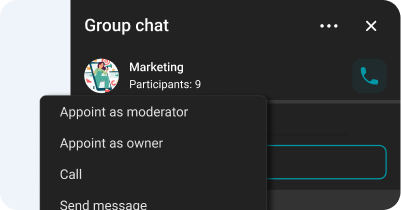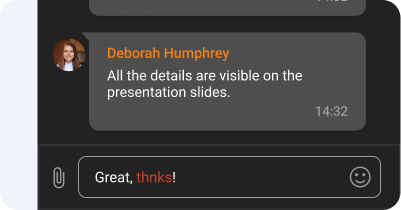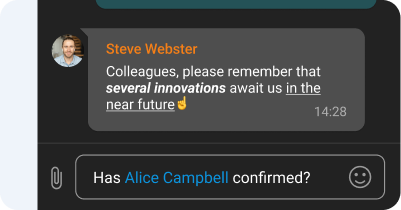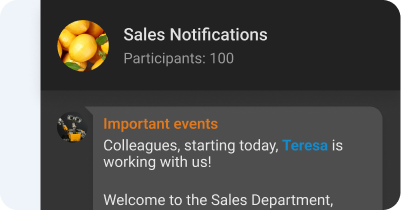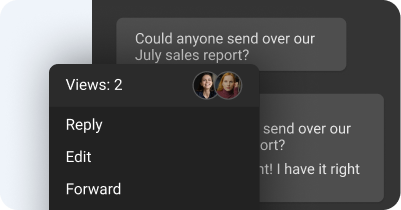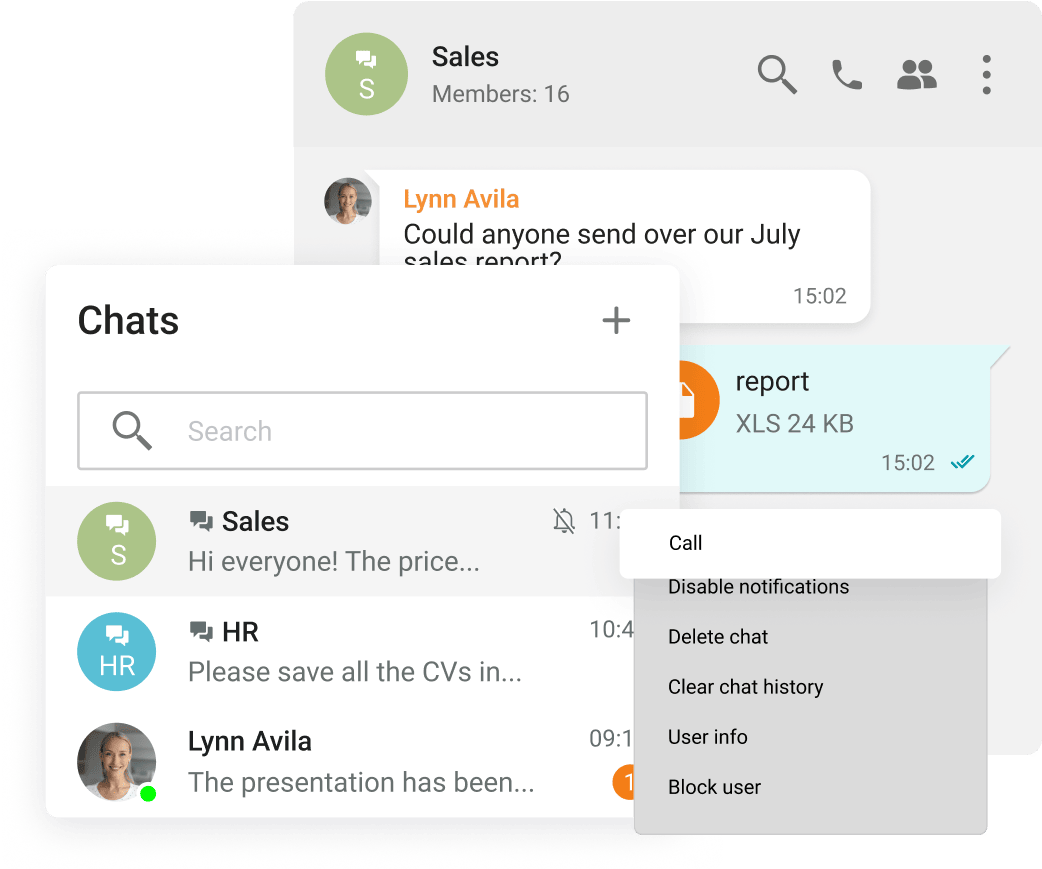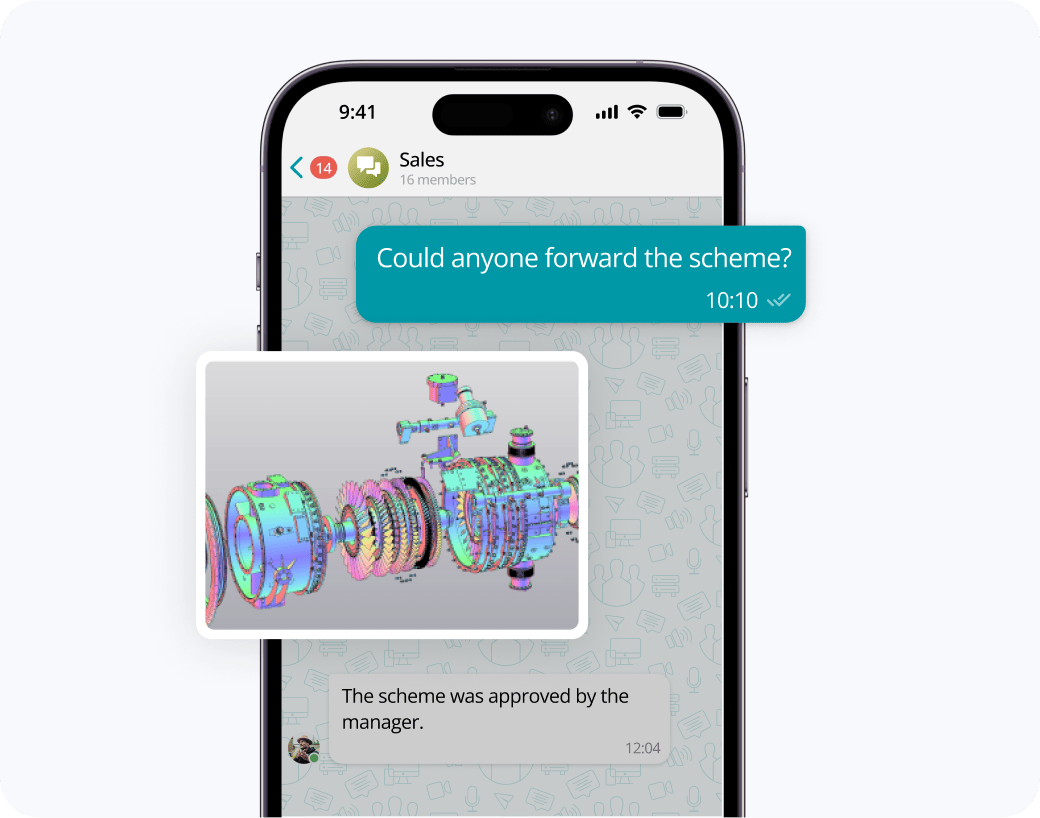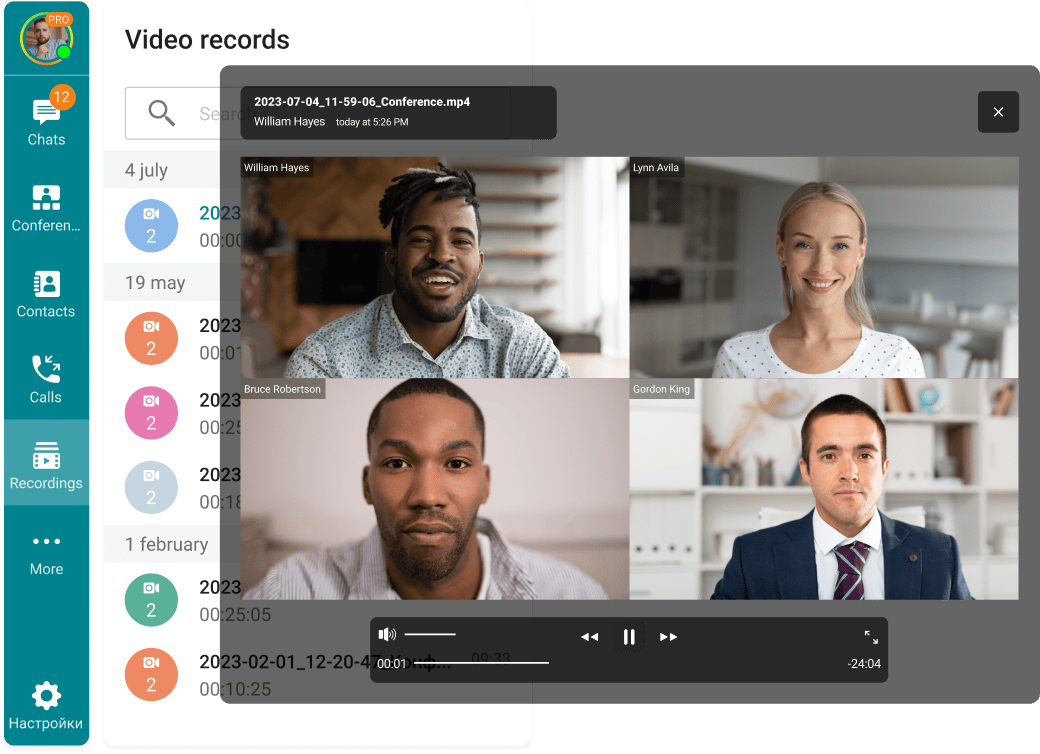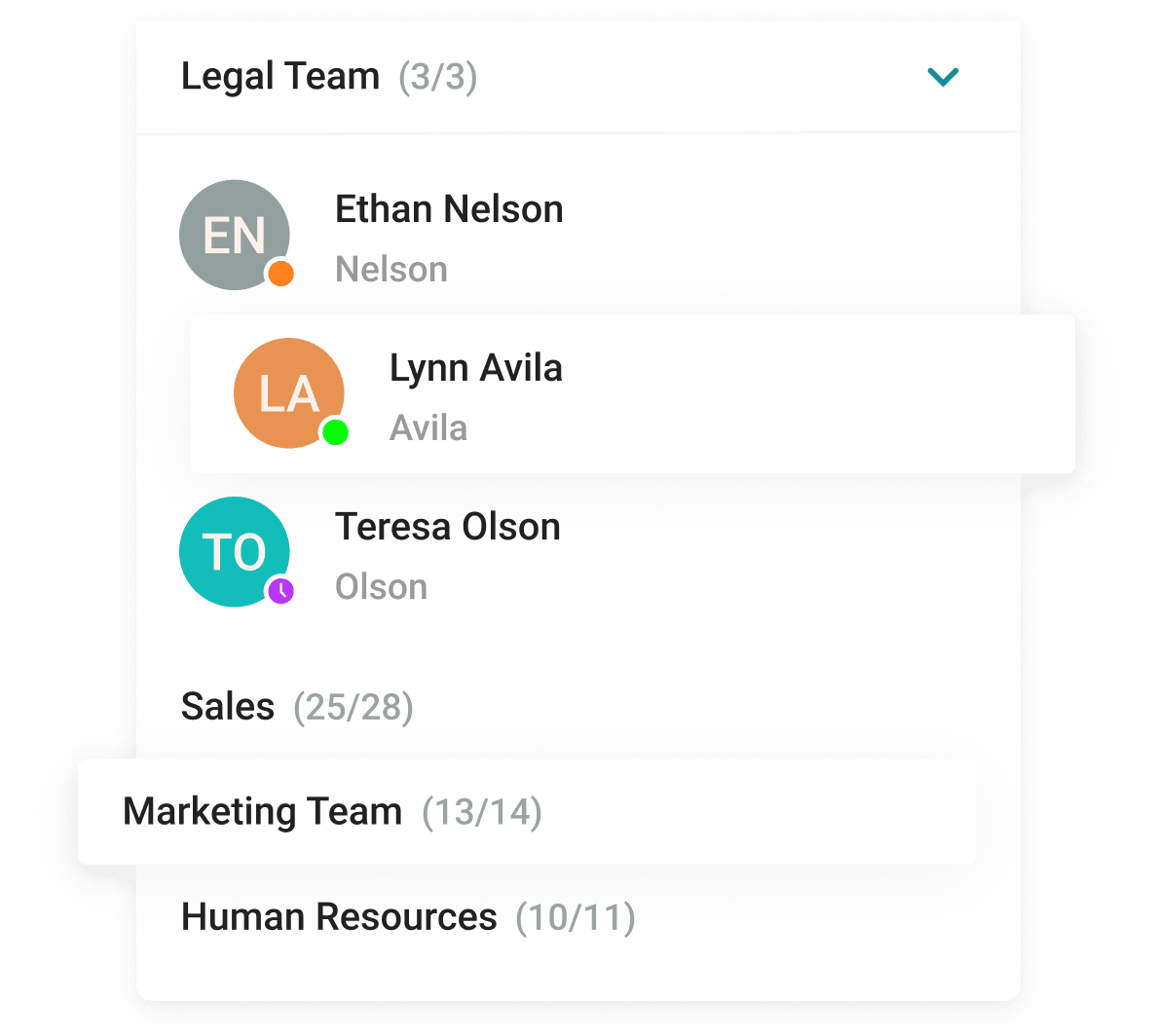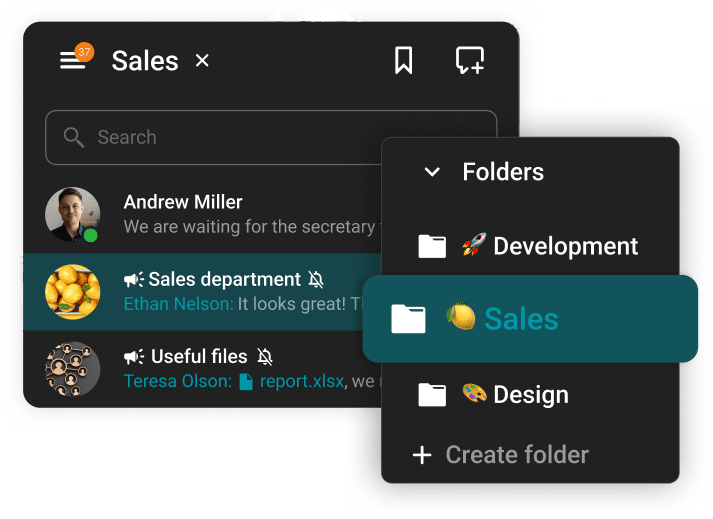Enterprise Messaging Solutions
Unify global teams with real-time messaging, group chats, and file sharing. Scalable architecture tailored for growing enterprises.

Unify global teams with real-time messaging, group chats, and file sharing. Scalable architecture tailored for growing enterprises.
Group and personal chats
Chat folders
Chat moderator management and ownership rights transfer
Spell-checking
Text formatting and Hyperlinks
Channels
Chat pinning
Message reading status
On-premises Installation
Capable of offline operation within a private network without an Internet connection required.
You Own Your Data
Your data never leaves your network.
Exchange messages during conferences and beyond! Respond to colleagues' requests in personal and group chats, swiftly transitioning discussions into online meetings.
Share files of any size and look through them right in TrueConf client applications.
View the resulting images and video files, as well as PDF documents, in TrueConf desktop client applications.
With the help of a convenient address book and department navigation, you can contact any employee of the company and see which colleagues are available for communication.
Arrange communication easily and conveniently, group chats into folders and add colorful emojis.









The group chat participants can easily find all the necessary documents as they are collected in the "File" tab.
Enhance the capabilities of the address book by integrating Active Directory or any LDAP directory with TrueConf Server.
Single Sign-On (SSO) technology, along with support for NTLM and Kerberos protocols, allows users of TrueConf client applications to securely log in without entering a username and password.
Download the corporate messenger for video conferencing and secure communication, for your operating system.
Organize video conferences and discuss tasks in chats wherever you are — all corporate communications in one mobile application. Download TrueConf mobile app!
Switch devices seamlessly – your messages are always handy in desktop and mobile apps.
The Enterprise Messaging Solution is a software that addresses the complex messaging communications needs of enterprises. It is designed to provide unified, secure, and efficient messaging for both external and internal enterprise communications.
Instant messaging, real-time group chats with presence status, multimedia file sharing, cross-platform capabilities, integration with existing enterprise IT architecture, and compliance with privacy regulations are just a few of the key features that a messaging software solution should provide. A unified messaging platform allows employees and teams to control all of their project management tools and communication channels from one place.
Companies without internal communication channels often force employees to regularly use different communication tools such as messengers, email, and audio and video conferencing platforms. According to statistics, 9% of work time is spent switching between these systems. On average, employees do this about 1,200 times a day.
• Access policy: A centralized messaging policy helps ensure the confidentiality and protection of critical information, differentiate access to data based on job responsibilities, comply with industry standards and regulatory requirements, and monitor and audit the organization’s communication processes.
• Built-in security mechanisms: All messages sent over the network must be encrypted. This means that even if someone intercepts these messages, they cannot read them. Only authorized users with the right keys can decrypt and view the content. In addition, each message must be digitally signed by the sender. This verifies that the message was actually sent by the person it came from, and not someone trying to impersonate someone else.
• Routing: The process of routing messages across the network should be efficient, and additional intermediate servers can be used for sensitive and confidential data.
• Subscription feature: The enterprise messaging system should support a subscription feature that allows users or groups to receive a specific type of message or content. For example, senior management can subscribe to all messages related to important financial issues. And sales managers can subscribe to information about new products and promotions. At the same time, different types of messages are routed differently, so that urgent alerts about work stoppages should be sent by the fastest route, while scheduled mailings can go through normal channels. Differences in routing can be due to different security policies and priorities. The main thing is that the system should allow flexible configuration of message delivery rules.
• Metadata: In an enterprise messaging system, it is important that all additional information about messages (who is the sender, to whom it is addressed, subject, date, etc.) is clearly defined and structured. For this purpose, the system should use special directories where all possible values for different metadata elements (e.g. list of topics, status, priorities, etc.) are pre-defined. The use of such directories allows to avoid inconsistencies and errors in metadata. This is very important because metadata is needed for the system to correctly categorize, process, and deliver messages.
Healthcare: Healthcare companies and institutions that provide healthcare and have access to patients’ personal information must ensure the privacy and security of electronic health information (ePHI) under the HIPAA law.
Law Firms: Law firms need to be especially careful when selecting software to exchange messages with clients to ensure the privacy and security of data such as litigation, claims, contracts, and financial agreements. And whether or not client information has become publicly available, maintaining confidentiality is a fundamental principle of a lawyer’s professional ethics.
Banking and Financial Institutions: Banks and financial institutions must comply with a number of key U.S. laws, such as the Sarbanes-Oxley Act, the Dodd-Frank Act, FINRA regulations, the Office of the Comptroller of the Currency, and Securities and Exchange Commission requirements, making the implementation of secure and reliable enterprise communications solutions critical for financial institutions. Implementing secure enterprise messaging systems allows an organization’s employees to share sensitive files and information without fear of data leakage or falling into the wrong hands, which is crucial for any online business to ensure secure communications.
Insurance companies: These platforms enable customers to quickly contact insurance staff, transmit multimedia files as proof of loss, and process claims in the shortest possible time. At the same time, the strict system of personal data protection within corporate communication tools eliminates the risk of confidential information leakage, which is particularly important for insurance organizations.
Increased communication security: Encrypted messages in accordance with the international certification ISO/IEC 27001: 2013, data storage and transmission on the company’s private servers ensure complete security of corporate communications, protection against data leakage and protection from unauthorized access by third parties.
Increased employee productivity: The unified communications platform, often integrated with the organization’s employee portal, ensures efficient interaction between employees, reduces decision-making time by providing quick access to necessary information, and enables instant discussion of issues with colleagues.
Consolidate communications: Enterprise messaging solutions combine group chat, service chatbot tools, corporate email, and other communications tools in one place, providing centralized access to communications tools.
Active Directory Integration: Automatically synchronize all user account data, including profile pictures, with the corporate directory. Active Directory enables centralized and convenient management of employee access rights to multiple communication channels.
Centralized Communications Management: Using a single enterprise platform, organizations can standardize and centrally control all internal communications, increasing the efficiency and transparency of business processes.
Reduce costs: A single platform reduces the cost of supporting and maintaining the many disparate software solutions required to support communications across the enterprise.
Global notification delivery: External communication systems ensure timely delivery of critical alerts, reminders, and information to the organization’s customers and partners around the world.


